EDITORIAL: Don’t tread on Sac State commuters
December 6, 2017
During his 2017 Fall Address, President Robert Nelsen declared Sacramento State a “hate-free campus.” In that same speech, he also expressed his desire to change the University’s reputation as a “commuter college.” Nelsen reiterated those thoughts two months later during his Community Council Breakfast on Oct. 27, where he was quoted as saying he hates “the ‘C’ word.”
Being mostly composed of commuters, our editorial board must ask how our university president can preach acceptance, community and diversity, while at the same time, marginalize such a massive part of the student population?
According to 2016-17 data from the Office of Institutional Research, 94 percent of undergrads and 72 percent of freshman at Sac State live off campus or commute. These percentages tell us that Sac State is most definitely a commuter college and that it will take an enormous amount of time and effort to change that.
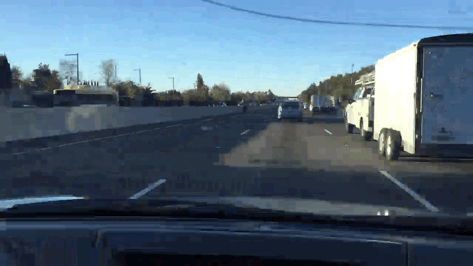
But we don’t see why commuters are such a problem for Sac State and take it personally that the University seems to be fantasizing about a campus free of people like us.
After year after year of driving as many as 80 miles each day to and from campus, some of our editors don’t want their efforts to be swept under the rug so the University can look more appealing to outsiders.
When our copy editor, Robert Todd, started here, his 2007 Honda Civic had a scant 36,000 miles on it. Now, after three flat tires, a roof stripped of its shiny blue paint and the phrase “FUCK YOU” lovingly keyed onto the trunk while it was parked in one of Sac State’s parking garages, that car is just shy of 100,000 miles.
That’s not to mention the recent repair costs he has incurred after running over a large piece of scrap metal in the wee hours of the morning during his daily commute, which totaled nearly two-grand out of his own pocket.
Now, we’re not naïve enough to think any of our cars are going to leave Sac State the same as when they arrived, and it’s not about the cars anyway. It’s about the hardship a crazy commute puts on students who are already taking on the difficult challenge of earning a degree.
State Hornet sports editor Angel Guerrero takes it to another level. He travels to and from Stockton every day, sometimes sleeping in his car to avoid falling asleep at the wheel after a long day. He also keeps his toiletries on-hand to freshen up at school after his early-morning, still-dark-outside drive, which he said he does to avoid the heavy traffic.
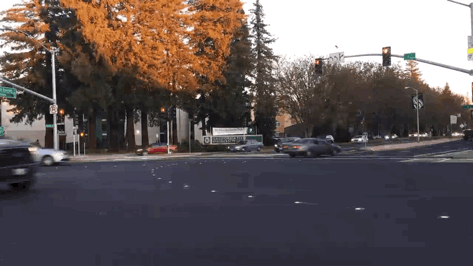
We can honestly say Angel is also one of the most dedicated and hardest-working students at Sac State. To have the commute he does, while being as outstanding of an editor as he is, makes for a student whom the University should want most to represent it. But if Nelsen gets his wish, it would seem Sac State has no place for diligent folks like him.
We at The Hornet have high hopes for what President Nelsen would like to accomplish, mostly.. We alway find his dedication to a tight-knit campus community free of discrimination admirable, and his personal underdog story about Calamity Jane’s saddle is both charming and inspiring. But Nelsen said himself that he keeps that saddle in his office to remind him of the students and their struggles.
Well, President Nelsen, we reach out to you now, on behalf of all the commuters at Sac State, to remind you that we too are struggling. We sacrifice a lot of time, sleep, money and the well-being of our vehicles to work toward better lives. So, instead of turning “commuter” into a dirty word, how about we highlight the added challenge mobile students endure?
We commuters all have our own “saddle stories,” after all, and the University should be proud to share them.





























































































































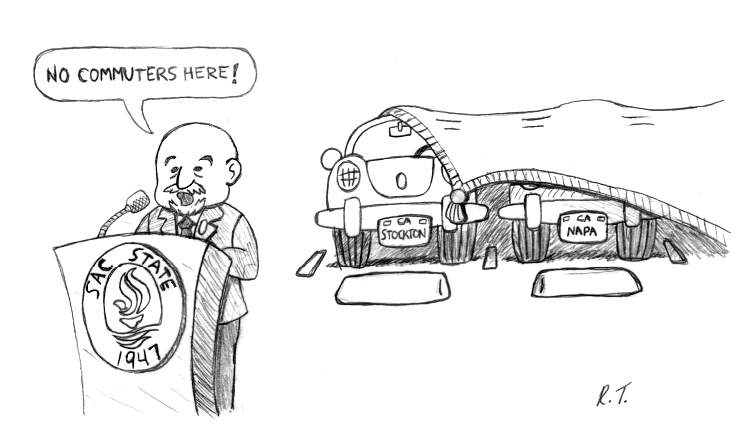

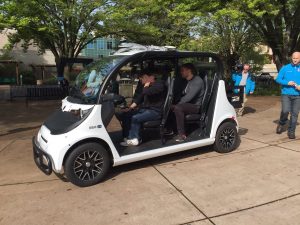
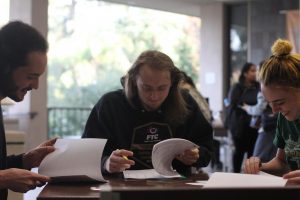



Collin Kemp • Dec 8, 2017 at 11:27 pm
The other Collin said everything I wanted to say. Commuting is bad for the environment as well as human health. Cars are unhealthy and dangerous! Worst of all, designing places and cities around the automobile instead of humans robs us of a sense of community and place. There’s nothing wrong with trying to change our campus by encouraging more housing on or close to campus. This editorial board should be standing up for positive changes — like how UEI Inc. is looking into a new housing development on Mcauliffe Field — instead of targeting President Nelson for his perceived war on commuters.
Collin Powers • Dec 6, 2017 at 4:38 pm
The reason Nelson used his rhetoric is because he has a dream that one day Sac State won’t just be a place where students drive to, go to class, then drive home. Students who live on or near campus are more likely to be involved in campus activity. Thats a fact. “Angel”, the guy you referenced, is an exception, not a rule. In fact, I agree with Nelson that we need to try and shed the commuter vibe that Sac State has for more than one reason. First off, students that live on campus are proven to get better grades than their commuter counterparts. Second, this paper recently wrote an article that attacked the school’s football program because of their low attendance and even went as far as to attack the viability of keeping the program. I haven’t done any research, but I’d be willing to bet that most of the students that attend those games live on campus or in the area. Nelson wants our school to be a first choice for incoming freshman. He wants us to have pride. He wants us to have good athletic programs. He wants us to have a real “College Experience”. He wants students to be passionate and be proud to wear that “S” mark on their school apparel. In the past year, this paper has managed to attack greek life, athletic programs, and now, the President who wants nothing but the best for this school? Maybe if this school had more people that lived on or around campus, we wouldn’t have to spend millions of dollars on parking garages, and instead spend that money on new classrooms, better athletic facilities, and on who knows what else. Commuters, when they make up such a large portion of the student body, rob the campus of a personality. Its time Sac State evolves from it’s stagnant, constantly mediocre level that this paper seems to promote. Its time this university realizes its potential, and I believe that President Nelson is the one to get us there.